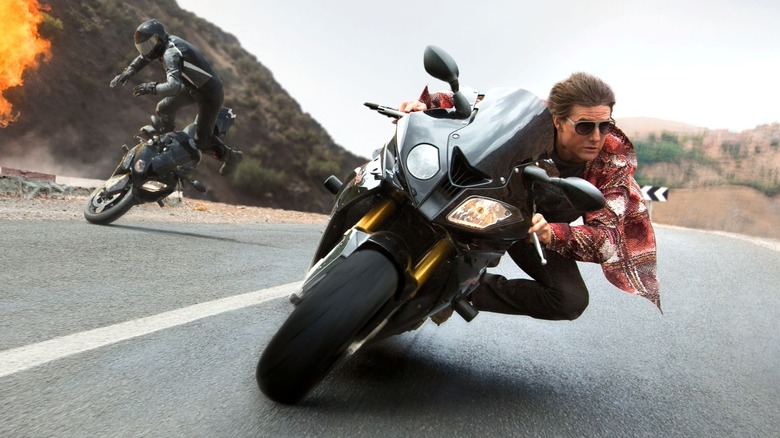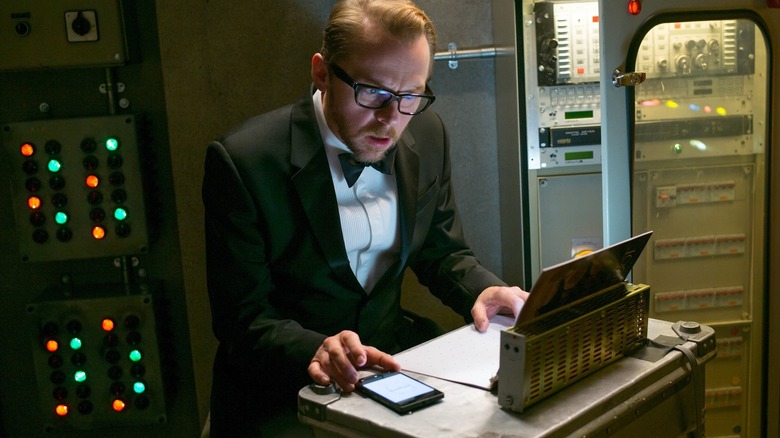A Critical Mission: Impossible - Rogue Nation Scene Was Written Just Hours Before Shooting
Christopher McQuarrie's 2015 film "Mission: Impossible – Rogue Nation" is arguably the best film in the series. Ethan Hunt (Tom Cruise) was getting a little older and was considered decreasingly trustworthy by his sour-faced bosses at the Impossible Missions Force. "Rogue Nation" saw him tracking down the identities of a rogue nation of ex-spies who were secretly working together to, essentially, destroy the world. Complicating matters, however, was a mysterious free agent named Ilsa Faust (Rebecca Ferguson) who had to commit secret spy shenanigans for her own reasons. Like "Mad Max: Fury Road" from the same year, "Rogue Nation" not only upped the voltage on the action but shifted focus away from the central male character, placing it instead on a much more interesting and capable woman.
This was also the third film to feature Simon Pegg as the character of Benji, a one-time desk jockey who had become an invaluable part of Hunt's spy team. Benji once thirsted for action, but found himself in a desperate situation at the end of "Rogue Nation." Benji was forcibly strapped into an explosive vest and sent to a restaurant to meet Ethan Hunt. The film's villain, Solomon Lane (Sean Harris), used an earpiece to dictate what Benji was to say to Ethan, forcing the neophyte spy to negotiate on his behalf. It's a tense climax to an already-intense movie.
On a 2022 episode of "Light the Fuse: The Official Mission: Impossible Podcast," Cruise and McQuarrie discussed the making of "Rogue Nation," revealing that the climactic diner scene was a question mark for much of the film's production. It wasn't until the scheduled day to shoot arrived that McQuarrie finally found inspiration. Cruise revealed that McQuarrie wrote the final monologue for the scene on the way to the set.
Poor Benji
Indeed, the script was so freshly written that Cruise didn't have enough time to memorize his lines. Pegg had to hold up notecards for Cruise to read during the scene. McQuarrie said they only had four days to shoot that scene and only a general idea of what was going to go into it. Cruise, however, was impressed with McQuarrie's ultimate scene and had nothing but positive things to say. To quote:
"McQ, when he knows how to write something — like when he feels it like an actor — it's very interesting. Like, when he feels it like an actor, he wrote the scene, he wrote that in like a day. That whole sequence, that structure just fell right into place."
Cruise doesn't elucidate on what he means that McQuarrie "feels it like an actor," but we may infer that the director was concerned more with character than with scenario; McQuarrie didn't brush up the scene with more action and excitement, but a conceptual confrontation with the villain. Cruise had to tell off the villain while looking Benji in the face. It was more exciting than any motorcycle chase. He said:
"And it's so fun because we'd been working, we're under a lot of pressure, we couldn't figure out the end. We knew this location. We walked around and it was like, 'Build a restaurant here, do this.' I don't know what's going to happen. And then I remember [McQuarrie] said, 'I know the scene.' And [he] pitched it to me like, 'I just don't have time to write it.' [He] wrote it that morning [...] on his way to work. [...] I read it and I was like, 'This is awesome!'"
Never let it be said that screenwriting is not an ongoing process.

